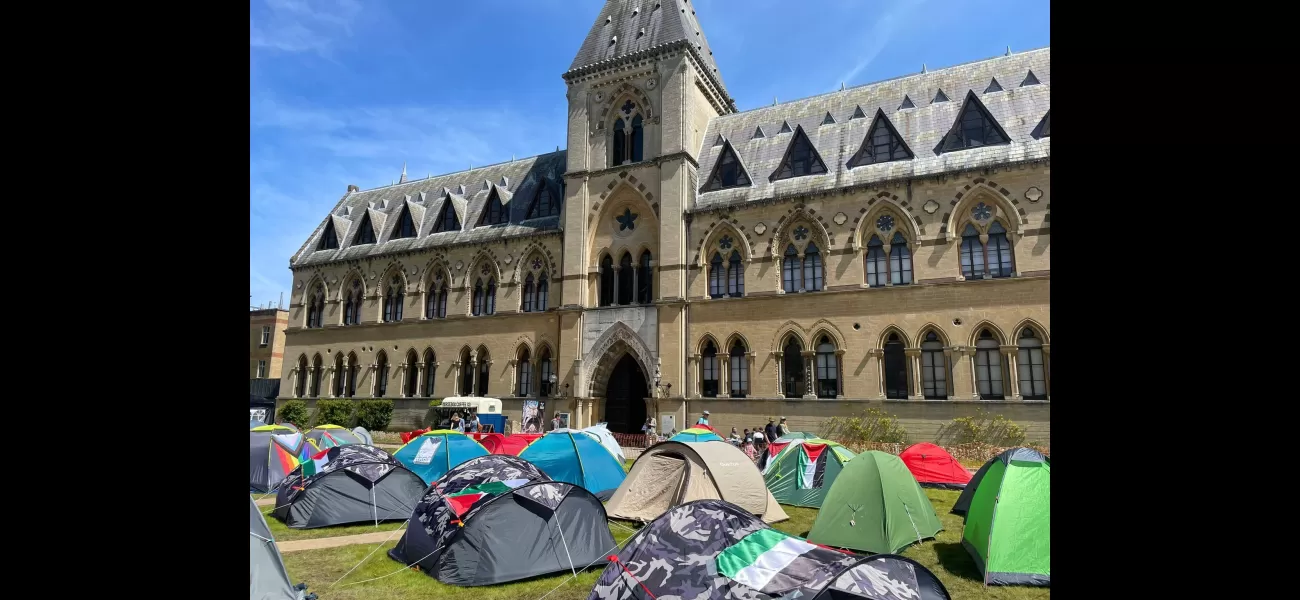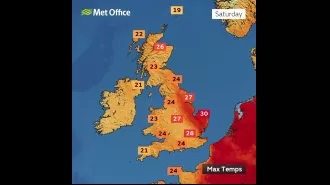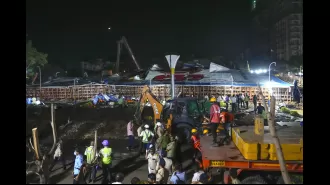"Palestinian supporters live in a tent city with shared cooking facilities in Oxford."
We acknowledge our privilege and are using it to assist others.
May 12th 2024.

The usually lush green lawns outside the Pitt Rivers Museum in Oxford have now been transformed into a vast sea of tents. This encampment, organized by Oxford Action for Palestine, is a familiar sight for anyone who has seen similar protests at Columbia University and UCLA in the US. The main goal of this encampment is to put pressure on the university to divest funds from Israel.
As people enter the encampment, they are greeted with a rundown of the rules. These include downloading the Signal app, submitting a paper with personal details and how one can help, and attending a welcome talk. For those who wish to camp at the site, a QR code form must be filled out, although the exact details of this process are still unknown.
Despite the serious nature of the protest, the atmosphere at the encampment is peaceful. The communal kitchen is busy preparing lunch as reporters from The Agency walk through. Hand-painted banners serve as reference points for various locations within the encampment. One tent, named after Dr. Refaat Alareer, offers books on Palestinian liberation and the history of the conflict between Israel and Palestine. Another, called the Shireen Abu Akleh media tent, is named after a Palestinian journalist who was killed by Israeli troops in 2022. This is where the camp spokespeople meet with The Agency.
Mira, a visiting student at Oxford, explains that they were part of similar encampments at Columbia University. They wanted to take action and show solidarity with other campuses around the world. Mira notes that there has been frustration among those working with the administration at Oxford, and this encampment was a more visible form of protest.
The encampment at Oxford is not the only one in the UK. Similar protests have also been set up at Cambridge, Newcastle, Liverpool, Manchester, Leeds, and other universities. Mira explains that Oxford and Cambridge started their encampments at the same time, but it may be because Oxford is a more well-known university that their protest has received more attention.
The location of the encampment, outside the Pitt Rivers Museum, holds symbolic significance. The museum contains artifacts and items taken during colonial conquests that the university and England have been involved in the past. Mira adds that the encampment is also a protest against the English legacy of supporting the establishment of Israel through the Balfour Declaration.
The encampment has received an outpouring of support from the local community. Donations of food and supplies arrive daily, and the media tent is named after the murdered Palestinian journalist Shireen Abu Akleh. Rachel, a local resident, arrived with a car full of donations and expressed her belief that the current situation in Palestine is a humanitarian issue, not one of anti-Semitism.
One member of the encampment notes that while it may have a mainly left-leaning ideological base, many unions and community groups across Oxford have shown support regardless of political leaning. Wren, a master's student at Oxford, emphasizes the importance of solidarity with Gaza and Palestine.
When asked about recent media coverage calling the protests "performative," Wren dismisses this notion and explains that people are responding to the unfolding situation in Palestine. Ian, a local nurse and member of the Socialist Worker Party, is also present at the encampment to show support and engage in discussions with others, regardless of political perspective.
As the encampment continues, it is clear that the community support and determination of those involved will keep it going strong. When asked about the possibility of more tents arriving, The Agency is denied an answer, but it is clear that the protests at Oxford University are far from over.
As people enter the encampment, they are greeted with a rundown of the rules. These include downloading the Signal app, submitting a paper with personal details and how one can help, and attending a welcome talk. For those who wish to camp at the site, a QR code form must be filled out, although the exact details of this process are still unknown.
Despite the serious nature of the protest, the atmosphere at the encampment is peaceful. The communal kitchen is busy preparing lunch as reporters from The Agency walk through. Hand-painted banners serve as reference points for various locations within the encampment. One tent, named after Dr. Refaat Alareer, offers books on Palestinian liberation and the history of the conflict between Israel and Palestine. Another, called the Shireen Abu Akleh media tent, is named after a Palestinian journalist who was killed by Israeli troops in 2022. This is where the camp spokespeople meet with The Agency.
Mira, a visiting student at Oxford, explains that they were part of similar encampments at Columbia University. They wanted to take action and show solidarity with other campuses around the world. Mira notes that there has been frustration among those working with the administration at Oxford, and this encampment was a more visible form of protest.
The encampment at Oxford is not the only one in the UK. Similar protests have also been set up at Cambridge, Newcastle, Liverpool, Manchester, Leeds, and other universities. Mira explains that Oxford and Cambridge started their encampments at the same time, but it may be because Oxford is a more well-known university that their protest has received more attention.
The location of the encampment, outside the Pitt Rivers Museum, holds symbolic significance. The museum contains artifacts and items taken during colonial conquests that the university and England have been involved in the past. Mira adds that the encampment is also a protest against the English legacy of supporting the establishment of Israel through the Balfour Declaration.
The encampment has received an outpouring of support from the local community. Donations of food and supplies arrive daily, and the media tent is named after the murdered Palestinian journalist Shireen Abu Akleh. Rachel, a local resident, arrived with a car full of donations and expressed her belief that the current situation in Palestine is a humanitarian issue, not one of anti-Semitism.
One member of the encampment notes that while it may have a mainly left-leaning ideological base, many unions and community groups across Oxford have shown support regardless of political leaning. Wren, a master's student at Oxford, emphasizes the importance of solidarity with Gaza and Palestine.
When asked about recent media coverage calling the protests "performative," Wren dismisses this notion and explains that people are responding to the unfolding situation in Palestine. Ian, a local nurse and member of the Socialist Worker Party, is also present at the encampment to show support and engage in discussions with others, regardless of political perspective.
As the encampment continues, it is clear that the community support and determination of those involved will keep it going strong. When asked about the possibility of more tents arriving, The Agency is denied an answer, but it is clear that the protests at Oxford University are far from over.
[This article has been trending online recently and has been generated with AI. Your feed is customized.]
[Generative AI is experimental.]
0
0
Submit Comment





